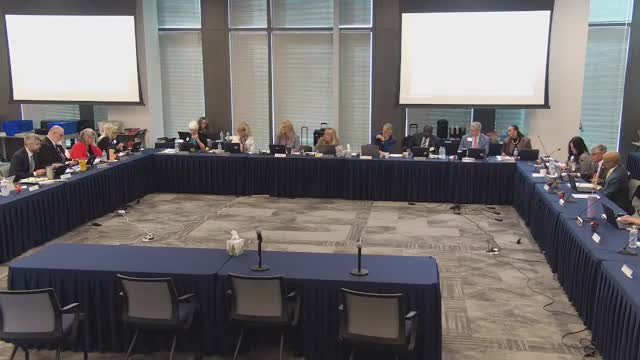Texas Board of Nursing proposes and approves rule actions, including complaint‑investigation updates and telehealth consent requirements
Get AI-powered insights, summaries, and transcripts
Subscribe
Summary
At its Oct. 23 meeting the board approved publishing proposed amendments to complaint‑investigation rules (22 TAC 213.13) and to telehealth rules (22 TAC 217.24), adopted a broader rule‑review response, and approved multiple administrative actions. The board also approved several routine agenda items by motion.
The Texas Board of Nursing on Oct. 23 approved a set of rule actions and procedural proposals affecting complaint handling and telehealth documentation and adopted a broader rule‑review package. Board counsel and staff described the proposed changes as steps to address enforcement audit findings and to implement recent legislation.
Complaint-investigation rules (22 TAC 213.13) Staff presented proposed amendments to 22 TAC 213.13 to revise complaint submission requirements, the complaint priority system and notification timelines to parties. The proposed language removes criminal background‑check specifics from the rule (staff said background checks are handled through other systems) and aligns procedures with current investigative practice. The board approved publication of the proposed amendments; if no negative public comment or hearing requests are received during the Texas Register posting period the amendments will be adopted and incorporated into an ongoing rule review.
Telehealth rule amendments (22 TAC 217.24) In response to House Bill 1700, staff proposed amendments to 22 TAC 217.24 to require informed consent documentation for telehealth encounters — including the nurse’s license number or multistate licensure privilege, contact/practice-location information, identification of any delegating physician where applicable, and disclosure of telehealth limitations and documentation retention requirements. The amendments cover audio‑only encounters as well as audio‑visual telehealth. The board approved publishing the proposed changes; staff will return with adoption if no negative comments or hearing requests are received.
Rule-review responses The board also reviewed public comments received during a larger rule‑review cycle of chapters 213, 214, 215, 216, 221, 222 and 227. Staff summarized two comment threads: one from private counsel arguing against a three‑year reapplication bar after an SOAH (State Office of Administrative Hearings) denial; staff recommended retaining the current three‑year waiting period because it prevents repetitious petitions after a fully adjudicated denial. The Texas Society of Anesthesiologists submitted comments about office‑based anesthesia and low‑dose IV ketamine; staff recommended awaiting the Texas Medical Board’s final position before seeking rule changes to avoid interagency conflict.
Other procedural votes and actions During the meeting the board approved routine agenda actions including adoption of the FY25 internal audit report, multiple consent agenda items and minutes approval. The board also adopted a PFD (proposal for decision) sanctioning one licensee (see Votes at a glance below). Where required by rule‑making procedure, staff will post proposed language in the Texas Register for a 30‑day comment period and return to the board with responses to any negative comments or hearing requests.
Why it matters: The complaint‑investigation amendments respond to enforcement audit recommendations and aim to modernize complaint handling and notice processes. Telehealth amendments implement legislative changes intended to ensure patients receive clear information when care is delivered remotely.
What’s next: Staff will publish the proposed amendments in the Texas Register and return to the board with any public comment or hearing requests. If no adverse comment is filed, staff will proceed to adopt the amendments as delegated by the board.
